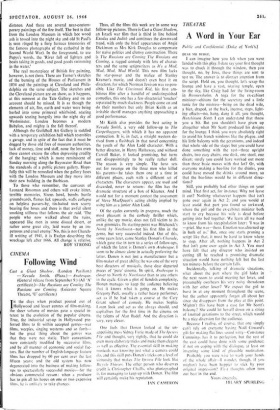Public and Confidential. (Duke of York's.)
THEATRE
A Word in Your Ear
DEAR MR BURGE,
I can imagine how you felt when you were landed with this play. I dare say your first thought was to chuck it through the window, then you thought, no, by Jove, these things are sent to test us. The answer is to distract attention from the script. Hold on, you thought, let's scrap the lounge and have a vast, soaring temple, open to the sky, like Craig had for the living-room in Rosmersholin. A toga for the ex-cabinet minister—chitons for the secretary and a little tunic for the mistress—bring on the dead wife, a bier, draped, at the back, incense, steps, light- ing effects—no, hang, dang it all, you thought, Hutchinson Scott. I can understand that threw you a bit. But you shouldn't have given up altogether when Mr Scott produced his designs for the lounge. I think you were absolutely right to avoid his french windows like the plague, and his little balcony with the geraniums, and indeed that whole side of the stage; but you could have done something with the rest—three upright chairs, two easy chairs, one desk, one stool, one divan; surely you could have worked out more than three basic moves with that lot? Or, with everyone making a bee-line for the drinks, you could have moved the drinks around more, so that the bee-lines would be in different direc- tions?
Still, you probably had other things on your mind. That first act, for instance. Why not leave it out? Nothing whatsoever happens that isn't gone over again in Act 2; and you would at least avoid that part you found so awkward, where the girl and the ex-cabinet minister both start to cry because his wife is dead before getting into bed together. We learn all we need to know from his recapitulation later: 'I was in —grief. She was—there. Emotion was churned up in both of us.' But, once one starts pruning a script like that, it must be hard to know where to stop. After all, nothing happens in Act 2 that isn't gone over again in Act 3. You must have felt that any director who insisted on cutting till he reached a promising dramatic situation would have nothing left but the last ten minutes before the curtain falls.
Incidentally, talking of dramatic situations, what about the part where the girl hides in the next room to avoid meeting her lover, and presumably overhears his very noisy showdown with her other lover? We expect the girl to burst in at any moment throughout the scene, but the author apparently forgot all about her since she disappears from the play at this point. Mightn't this have been a case for Mr Scott's balcony? She could let herself down on a string of knotted geraniums to the street, which would be a nice diversion for the audience.
Because I realise, of course, that one simply can't rely on everyone having Noel Coward's gift for making flat lines sound witty—Constance Cummings has it to perfection, but the rest of the cast could have done with some guidance; if not on coping with the dialogue, at least on inventing sonic kind of plausible motivation.
Probably you were wise to wash your hands of the whole affair—I wonder, though, if you mightn't have been happier to stick by your original impression? First thoughts often turn out best in the end.
Yours sincerely, HILARY SPURLING






























 Previous page
Previous page